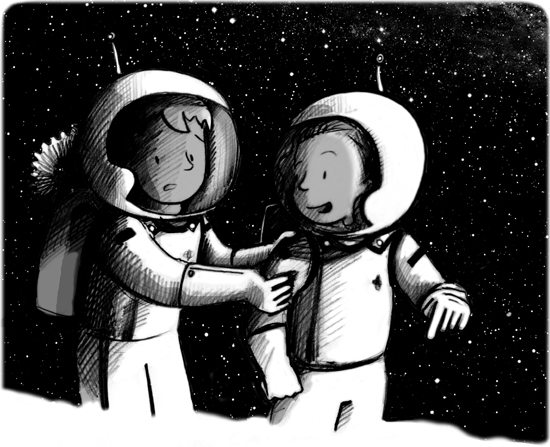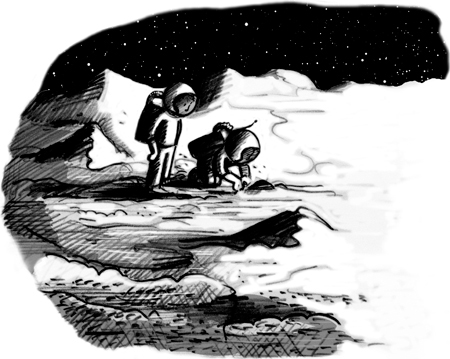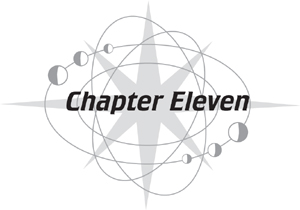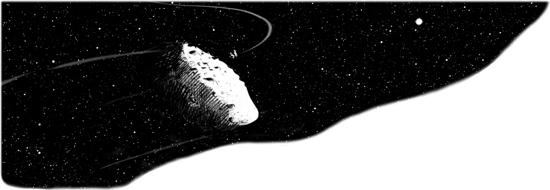When he leaped over the threshold of the portal door, George found he was floating—not going up, not going down, just drifting in the huge, great darkness of outer space. He looked back toward the doorway, but the hole in space where it should have been had closed over as though it had never been. There was no way back now and the giant rock was getting closer all the time.
“Hold my hand!” Annie shouted to George. As he gripped her hand in its space glove even harder, he started to feel as if they were falling down toward the comet. Moving faster and faster, as if they were on a giant Tilt-a-Whirl, George and Annie spiraled toward the huge rock, getting closer and closer all the time. Beneath them, they could see that one side of the comet, the part facing the Sun, was brightly lit. But the other side, which the Sun’s rays didn’t reach, was in darkness. Eventually they landed in a heap on a thick layer of icy, dust-covered rubble. Luckily they’d come down on the bright side of the comet, so they could see what lay around them.
“Ha-ha-ha-ha!” Annie was laughing as she picked herself up. She hauled George to his feet and brushed bits of dirty ice and crumbly rock off him. “So?” she said. “Do you believe me now?”
“Where are we?” said George, who was so surprised he forgot to be scared. George felt extremely light. He looked around and saw rock, ice, snow, and darkness. It was like standing on a giant dirty snowball someone had thrown into outer space. Stars blazed everywhere, their fiery glow quite different from the twinkling lights he saw from the Earth.
“We’re having an adventure,” replied Annie. “On a comet. And it’s real—it isn’t a made-up story, is it?”
“No, it isn’t,” admitted George. He patted her space suit awkwardly. “I’m sorry I didn’t believe you, Annie.”
“That’s all right,” said Annie generously. “No one ever does. That’s why I had to show you. Look, George!” She waved an arm around. “You’re going to see the planets in the Solar System.” She started to pull a length of rope out of a pocket in her space suit. On the end of the rope was a spike, like a tent peg. Using her space boot, she jammed the spike into the ice on the comet’s surface.
Watching her, George gave a tiny little jump for joy. Even though he was wearing the space suit that had seemed very heavy on Earth, he couldn’t believe how light he felt. So light that he thought he could leap as high as he wanted. He did another little jump across a little crack on the comet’s surface. This time he went up and forward, but he didn’t come down again. He seemed to be taking a giant leap, maybe hundreds of feet long! He’d never be able to find Annie again . . .
“Help! Help!” George called through the helmet as his jump carried him farther and farther away, his arms whirling in the surrounding emptiness as he tried to make himself fall down onto the comet. But it was no good. Annie was far away in the distance now—he could only just see her when he looked back. The comet’s surface was passing quickly below him. He could see holes and little hills everywhere, but nothing that he could grab on to. But at last he seemed to fall. The ground was getting closer now, and as he landed he slid on the ice near the threshold between the bright and the dark side of the comet. In the distance, he saw Annie carefully running toward him.
“If you can hear me, don’t jump again!” she was saying in a very urgent voice. “If you can hear me, don’t jump again! If you can—”
“I won’t!” he called back as she reached him.
“Don’t do that, George!” said Annie. “You could have landed on the dark side of the comet. I might never have found you! Now stand up—the boots have small spikes on their soles.” She sounded very grownup and not at all like the impish little girl he had met at Eric’s house. “A comet is different from the Earth. We weigh much less here than we do there, so when we jump, it can take us a long, long way. This is a different world. Oh, look!” she added, changing the subject. “We’re just in time!”
“For what?” asked George.
“For that!” Annie pointed to the other side of the comet.
Behind the comet was a tail of ice and dust, which was getting steadily longer. As it grew, it caught the light from the faraway Sun and glistened in the wake of the comet, making it look as though thousands of diamonds were shining in outer space.
“That’s beautiful,” whispered George.
For a minute he and Annie just stood there in silence. As George watched the trail grow, he realized it was made up of bits of the bright side of the comet.
“The rock’s melting!” said George in a panic, clutching Annie’s arm. “What will happen when there’s nothing left?”
“Don’t worry.” Annie shook her head. “We’re just getting closer to the Sun. The Sun slowly warms up the bright side of the comet and the ice turns into gas. But it’s okay because there’s enough ice here for us to pass the Sun loads of times. Anyway, the rock under the ice won’t melt. So we won’t start falling through space, if that’s what you’re scared of.”
“I’m not scared!” protested George, letting go of her arm very suddenly. “I was just asking.”

“Then ask more interesting questions!” said Annie.
“Like what?” asked George.
“Like, what would happen if some of the rocks from the comet’s tail fell on the Earth?”
George kicked some dust around and then said reluctantly, “All right, what would happen?”
“Now that is a good question!” said Annie, sounding pleased. “The rocks catch fire when they enter the Earth’s atmosphere, and from the ground, when we look up, they become what we call shooting stars, or meteors.”
They stood and gazed until the comet’s tail got so long they couldn’t see the end of it. But as they were watching it, the comet seemed to start changing direction: All the stars in the background were moving. “What’s happening?” George asked.
“Quick!” Annie replied. “We’ve only got a few seconds. Sit down, George.” She cleared two little spaces on the ice, speedily brushing the powder aside with her glove. Reaching into another pocket of her suit, she produced what looked like climbing hooks. “Sit down!” she ordered again. She screwed the hooks into the ground and then fastened them onto a longish piece of cord hanging from a buckle on George’s suit. “Just in case something hits you,” she added.

“Well, I don’t know. My dad normally does this part,” she replied. Next, she sat down behind George and did the same to herself. “Do you like roller coasters?” she asked him.
“I don’t know,” said George, who had never been on one.

“Well, you’re about to find out!” said Annie, laughing.
The comet was definitely falling—or at least changing direction toward what seemed to be “down.” From the way the stars were moving all around him, George understood that the comet was falling very fast. But he couldn’t feel anything—he didn’t have butterflies in his stomach, and there was no rush of air blowing past him. It wasn’t at all how he had expected a ride on a roller coaster to feel. But he was starting to realize that things feel very different in outer space from the way they do on Earth.
George closed his eyes for a moment, just to see if he could feel anything at all. But no, nothing. Suddenly, with his eyes closed, he realized that something in space must be pulling them and the comet toward it for the comet to change direction like that. George instinctively knew that this something was probably much, much bigger than the comet on which he and Annie were surfing through outer space.

